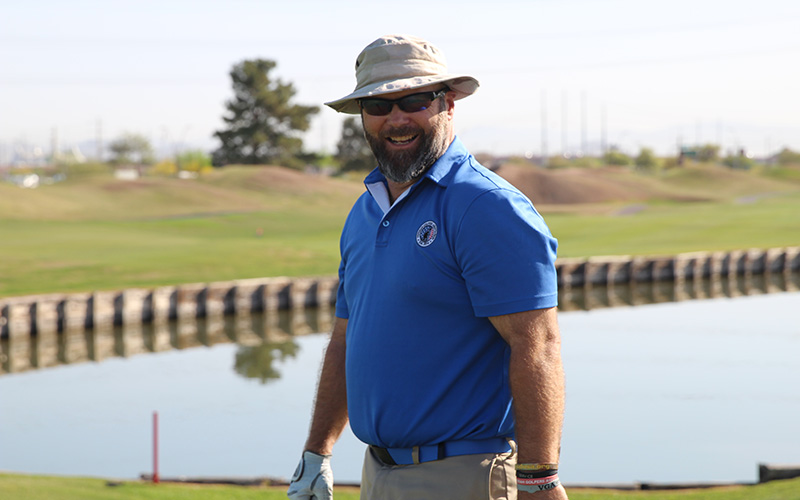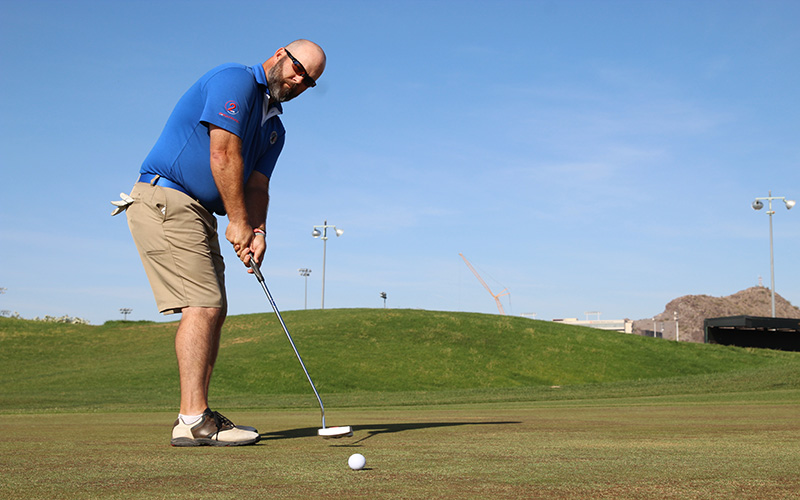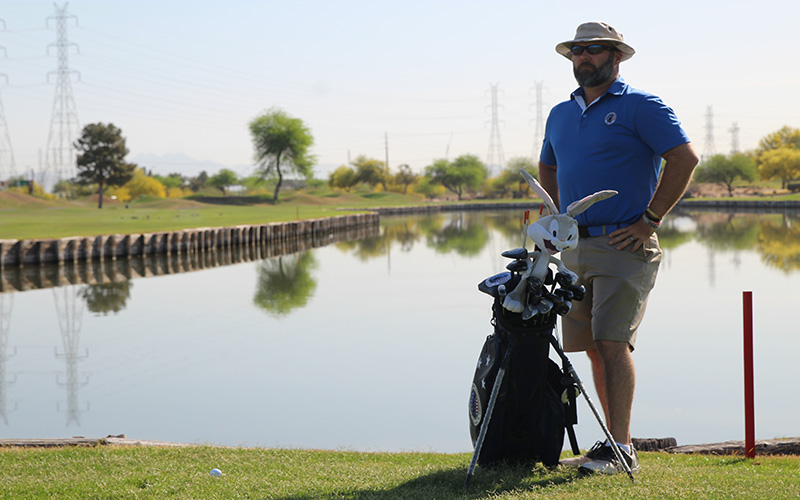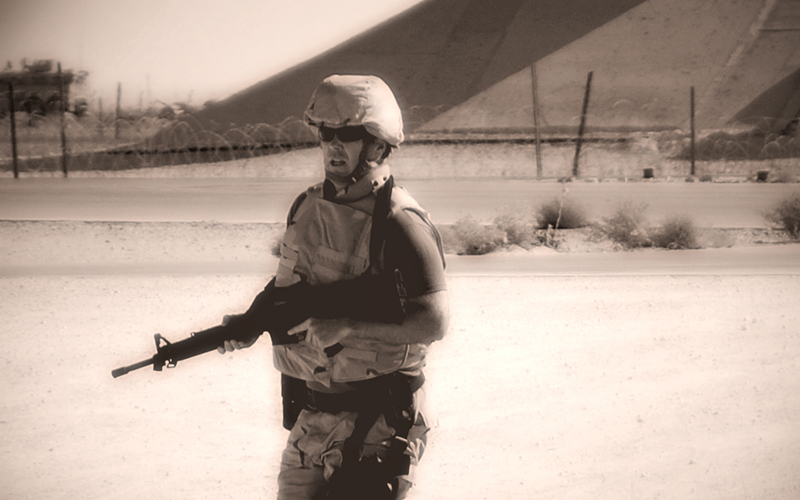
Navy veteran Dave Delano, 43, suffers from post traumatic stress disorder and is deemed unemployable. After battling PTSD on his own, he uses golf and the Veteran Golf Association as a release and an outlet. (Photo by Tyler Strachan/Cronkite News)

Like many vets, Dave Delano, who served two tours of duty in Iraq, struggled with finding self-worth while transitioning into civilian life. He’s the director of the Veteran Golf Association. (Photo by Tyler Strachan/Cronkite News)

Veterans who try the Veteran Golf Association won’t be coddled, Dave Delano said. “There is no one in our circuit that is going to help you feel bad for you. They are going to sit there and say ‘Buck up, buttercup, let’s go out there and have some fun.’” (Photo by Tyler Strachan/Cronkite News)

Navy veteran Dave Delano was part of 10 deployments, including two to Iraq. He left the service in 2014 and suffers from post traumatic stress disorder. (Photo courtesy Dave Delano)
PHOENIX – It was Cinco De Mayo in 2016 when 20-year Navy veteran Dave Delano found himself in the emergency room suffering a severe panic attack.
Delano, who was part of 10 deployments, including two to Iraq, is one of many veterans who struggle with post traumatic stress disorder and depression.
“I was fighting for so long I didn’t know how to run the other way,” Delano said.
In 2015, he was asked what brings him happiness. The answer was easy.
“I literally got prescribed by a doctor to play golf to help with my PTSD.”
A large numbers of veterans suffer from post traumatic stress disorder. The U.S. Department of Veteran Affairs believes 11 percent of veterans from the war in Afghanistan were afflicted and 20 percent of those in Iraq.
Before experiencing symptoms of PTSD, Delano was an extrovert and someone who always had people gravitating toward him, his wife, Sara, said. That soon changed.
“I always used to tell him he always made a new best friend everywhere he went and he went from being that to completely opposite,” she said.
Delano, who lives in Gilbert, retired from the Navy in 2014. He is 100 percent disabled due to PTSD and is deemed unemployable.
While looking for cheaper golf rounds, Delano, 43, stumbled upon the Veteran Golfers Association.
The VGA was created by several veterans who wanted to use the game of golf to bring vets, from all places, together. It hosts more than 250 local tournaments across the country plus a national championship.
Delano played several tournaments in 2015 for the VGA but still found himself anxious around people. He continued to struggle with his identity, which was a big cause of his trip to the emergency room.
“If he is not working, if he’s not a sailor, a manager, what have you, then what am I?” Sara said.
Dave eventually volunteered to be the director of the organization.
Like many veterans, Delano struggled with finding self-worth while transitioning into civilian life.
“I just had no direction, for 26, 27 years of my life,” he said. “I was always going and doing and it just all of a sudden stopped on me and I wasn’t able to do things.”
Golf has helped him clear his brain and get his life in order.
“Outside of being with my family, being on the golf course is the only place that really I can calm myself and really enjoy the outdoors and being outside of the house,” he said.
For many, the main purpose of the VGA is the best part, and it doesn’t involving shooting the best score out of your group.
“It is to go out and meet different people that have been through the same things that I have been through,” said Ali Long, a 25-year Army veteran.
Bringing vets together plays a large part in a successful transition to the civilian world and helps the ones who struggle with mental health in their daily lives.
“The world of the military versus the world of the civilians is night and day,” Dave said, “and often times there aren’t people when we transition into a workplace that have any like experiences whatsoever. So it will often alienate a military person, not on purpose, but the commonality doesn’t exist.”
Dave insists that sympathy or empathy is not wanted or needed, and many in the VGA agrees.
“There is no one in our circuit that is going to help you feel bad for you,” Dave said.”They are going to sit there and say ‘Buck up, buttercup, let’s go out there and have some fun.’ ”
The fight against PTSD is hard not only on those going through it but the family members who have to sit and watch.
Being observant and sensitive to what they are going through is key, Sara said.
“You need to keep a level head and you need to really watch for the signs when you are having a bad day, when they are going through a really tough time and to be sensitive about that,” she said.
When Dave wanted to get involved in the VGA, Sara was by his side, which is another important factor in helping a spouse or family member, the group believes.
“If there is something that they are showing interest in and to really support them in doing it,” she said.
Go to the VGA’s website – www.vgagolf.org – for more information.
Follow us on Twitter.